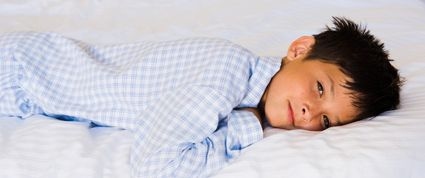
Bedwetting is a cause of frustration for many parents. If you are like me, you may have gone through countless articles looking for the magic cure to your child's bedwetting problem. Unfortunately, there is no quick fix for bedwetting. Bedwetting in children under five is considered normal. Enuresis, the medical term for bedwetting, is when a child above the age of five wets the bed two or more times per week for a period of three months or longer.
If your child is over five and wets the bed, it is important to have a medical evaluation. Bedwetting can be caused by structural disorders of the urinary tract, neurological deficits or developmental delays, and it can also be an indicator of juvenile diabetes. Most often, however, there is not a clearly defined cause of bedwetting. One theory on bedwetting is over production of night time urine. Normally, the body slows down production of urine at night. Some researchers believe the bedwetting child simply makes too much urine at night. Another theory is that the bedwetting child is a very sounds sleeper and does not wake up from the stimulus of a full bladder. Another possible cause is bladder capacity. Some children's bladders develop slower than others. They just can't hold as much urine. Although, emotional stress or sexual abuse can sometimes cause bedwetting it is not a common cause of bedwetting.
Treatments for bedwetting
There are medications available for treatment of bedwetting. Medication does not work for all children and relapse is common when children stop taking the medication.
Another option is an alarm system. An alarm is attached to the child's underwear or some type of padding on the child's bed. The alarm goes off if it gets wet. The belief is the child will learn to awake on his or her own and go to the bathroom instead of wetting the bed. Results vary.
Parents can also try limiting fluids after dinner and waking the child to go to the bathroom at night. These tactics, however, only work for some children.
Coping with bedwetting
Bedwetting can be very stressful for both the child and the parent. Fortunately, almost all children do outgrow bedwetting. Some children may wet the bed into their teen years, but very rarely is bedwetting seen in adults.
Bedwetting essentials
Pullups - Pullups are very effective in helping the parent and child cope with bedwetting. An older child may not want to wear pullups. I do not recommend forcing a child to wear pullups. Simply use a mattress pad or liner and have the child help with laundering the wet clothes.
Mattress cover and padding - Unless you want to replace your mattress several times a year a good mattress cover and padding is essential.
Deodorizing sprays - Odoban is an excellent way to cut down odors. Febreeze is another alternative, but it is not quite as effective.
